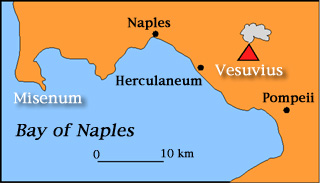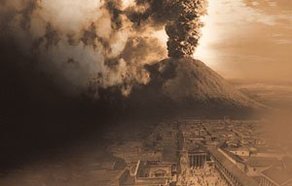Pliny the younger

Pliny the younger was a Roman official and writer, famous for his letters which are an important source for Roman History, this is because it provided valid information on the first written documentation of an explosive eruption in a series of letters describing the circumstances surrounding the death of his uncle, Pliny the Elder. Gaius Pilinius Caecilius Secundu, known as 'Pliny the Younger', was the son of a landowner from Comum in Northern Italy, who was brought up by his uncle 'Pliny the Elder', after the death of his father. Pliny the Elder, was the author of a famous encyclopedia on natural history. In 79 AD, Pliny the younger witnessed the eruption of Mount Vesuvius which killed his uncle. At the time of eruption, Pliny the younger, was seventeen years old at the time who gave a very accurate account of the eruption which has survived to this day in the form of two letters which he wrote to his friend, the historian Tacitus. The historian Cornelius Tacitus asked Pliny to write an account of his uncle's death so that there could be a record for posterity. Pliny replies to is letters that he know that "immortal fame awaits him of his death is recorded by you" .He explains in his letters that his uncle Pliny the elder lived at Misenum and was the commander of the Roman fleet which was stationed in the harbour Misenum. At the time of the eruption of Mount Vesuvius, Pliny the Younger was located at the port of Misenum where he had a good view of Vesuvius across the Bay of Naples to the west. In these letters Pliny the younger describes the eruption of Mount Vesuvius as a "broad sheets of fire and leaping flames that glared through the darkness of the night".
Pliny's perspective of the eruption

At the time of eruption the Roman senator and author, Pliny the younger, was seventeen years old. He later gave a very accurate account of the eruption which has survived to this day in the form of two letters which he wrote to his friend, the historian Tacitus. In his letters it mentioned how a volcano seemed to an ancient Roman. "There had been tremors for many days previously, a common occurrence in Campania and no cause for panic. But that night the shaking grew much stronger; people thought it was an earthquake, not just a tremor ... Now the day begins, with a still hesitant and almost lazy dawn." The first account of Pliny's letters is of the events in the immediate surrounding of Vesuvius where Pliny's uncle was stationed. Although his uncle did not survive the eruption, Pliny the younger received the account from sailors who managed to escape and described the events. He himself lived with his mother in Misenum some few miles from Pompeii. In his second letter to Tacitus he described his own account of the events in his town, which fortunately was distant enough not be destroyed by the eruption but still close enough to experience the strong effects of the volcano. "The cloud was rising from a mountain - at such a distance we couldn't tell which, but afterwards learned that it was Vesuvius. I can best describe its shape by likening it to a pine tree. It rose into the sky on a very long trunk from which spread some branches." He explains that his uncle's "scholarly acumen saw at once that it was important enough for closer inspection, and he ordered a boat to be made ready". He mentions that his uncle invited him to accompany him, "but I preferred to go on with my studies". He explains in his letters that his uncle had a change of mind and had intended on launching his warships and to rescue as many people as possible from the danger zone of Mount Vesuvius where many people were fleeing. He explains that his uncle was as "fearless, describing each new movement and phase of the portent to be noted down exactly as he observed them". He mentions that when one of the ships approached Mt Vesuvius there were hot ashes falling, and later there were showers of plume and blackened stones, which had been charred by the flames. The debris from the mountain block had given access to the shore and filed the bay so that it had become shallow. Pliny the Younger provided an account of his uncle's death, and suggested that he collapsed and died through inhaling poisonous gases emitted from the volcano. On August 26th, his body was found under the ashes of Vesuvius with no apparent injuries, after the plume had dispersed, confirming poisoning.
reliability |
Lass |
The Pliny letters was a unreliable source as it was written 25 years later after the eruption of Mount Vesuvius. Pliny was bias as he mentioned in his letters that his uncle was a hero. There wasn't much information to show if his uncle did really die or was just washed away by the sea while trying to get across to Pompeii. A reliable source would be that he showed insight and clear information in his letters about the eruption and the devastation of Mount Vesuvius. Both of his accounts describes the 79 AD eruption of Mount Vesuvius in Pompeii showing information of the death of his uncle, Pliny the Elder. His letters, are in fact the first written accounts of the explosive which helps us gain a some what knowledge of what Roman life was during the eruption of Mount Vesuvius 'Plinian' in 79 AD.
significance
Pliny's letters provides a fascinating insight into Roman life. Pliny's letters were a significant primary source of evidence as it gave us valid information about his observation of the eruption of Mount Vesuvius in 79 A.D. It showed information visually about the volcano and the death of his uncle and it showed clear information about the eruption and the devastation it caused on August the 24th.
